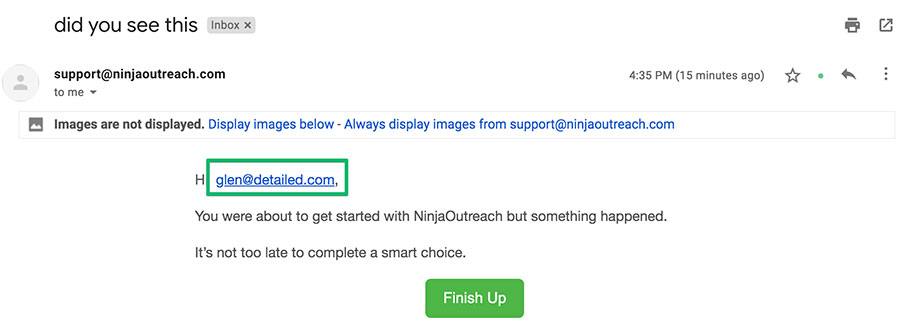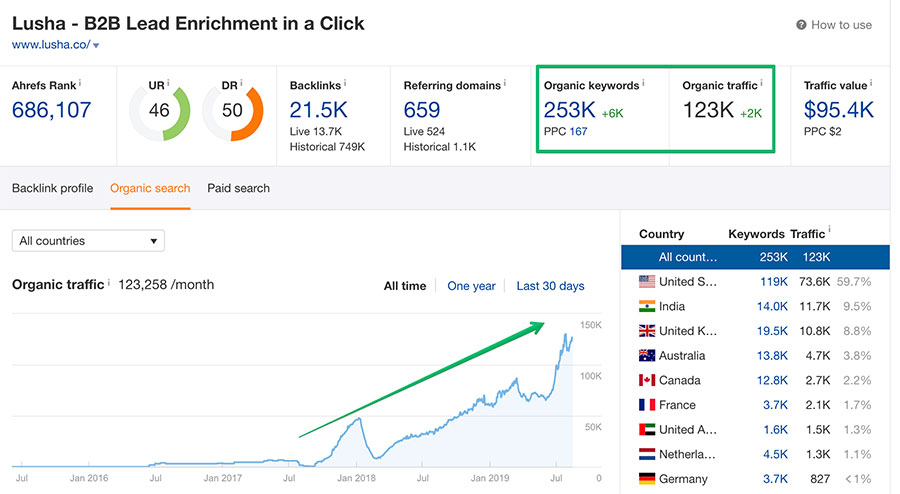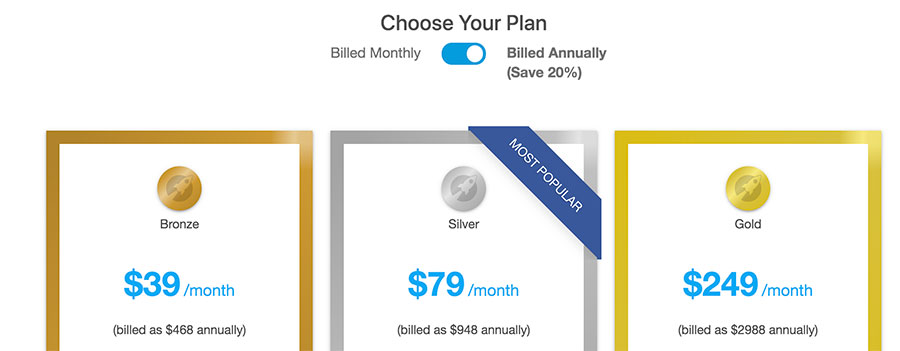I once spent many months and many thousands of dollars on a business idea I shut down without telling a soul.
My reasons for shutting it down were due to conflicts of interest, rather than losing my passion for the idea. I still think someone will make a lot of money following on from my original plan.
I’ve never told anyone about that plan, until now.
As I’m constantly looking for online success stories I can potentially model, coming across the revenue numbers of a company called NinjaOutreach was particularly interesting to me.
NinjaOutreach, and many others like them, are primarily focused on selling “profiles” – which typically equates to email addresses – of people you might want to get in touch with.

They quickly passed $20,000, $30,000 and then $50,000 MRR (Monthly Recurring Revenue) which is the point I took a serious interest in their operations.
I had the chance to invest in the company fairly recently so I know their latest numbers, but don’t feel it’s right to share what isn’t in the public eye.
$50,000/m is a recent enough stat, so that should at least give you an idea of how well they’re doing.
A big part of their marketing was towards SEOs like me, inviting you to find the contact details of people who could link to your website and then messaging them at scale.
I’m an SEO who greatly prefers taking a slow, personal approach to outreach, so I have no interest in picking up the details of thousands of people and sending templated emails.
I did take a look inside though, and the data I saw was just…wrong.
My understanding of NinjaOutreach is that they crawl the web and assign emails based on what they find written publicly (at least for the most part).
They also do this for social media profiles.
Out of curiosity, I checked the data they had on me.
The premium version of NinjaOutreach shows that I, Glen Allsopp, own a popular Instagram account about dogs.
I don’t.
Clicking around, the data just seemed so wildly inaccurate for the people that I saw.
It kind of blew my mind when you consider their revenue numbers.
(Note: I have not used NinjaOutreach in quite a while so this concern may no longer be accurate. If people are still paying them, they must be doing something right. I take my hat off to anyone able to build a successful startup.)
At the time, this led to a massive lightbulb moment for me.
If people are happy to pay that much information to send emails to people that might not receive them, what would they pay for emails that are correct?
What about when they’re attached to emails that clearly aren’t automated (we’ll get to how I would achieve that in a moment).
The logic just made so much sense to me: Find the emails of people I would actually want to contact (top bloggers, journalists, and so on) and manually verify every single one.
It would be a slow process, sure, but I would literally have the most accurate data on the market.
For the next few months I had a couple of assistants help me put together exactly that.
We were adding hundreds of new email addresses to our database every single week.
We got to the point where having thousands of verified contacts felt like a pretty huge achievement, but when the likes of RocketReach boast having data on over 400 million people, it’s a little bit small in comparison.

Then, one day, as things were going really well, I decided to stop things completely.
Something on my moral compass just didn’t sit quite right (though I still think it can for others).
You see, being in the business of SEO, I talk with a lot of journalists, bloggers and webmasters.
Often with the hope (not the expectation) that the work I and others do might get noticed in the process.
The problem with having a database in the thousands and selling access in a similar range is that I’m really amplifying the chance that certain people will receive a lot of emails.
Due to my SEO-focused audience, I realised I was basically saying: “Here’s 5,000 emails to go and ask for links.”
In other words, I would be responsible for annoying the very people I try to get the opposite reaction from.
I’m still incredibly passionate about the idea – especially when I share the following two ways I would take it to the next level – but something would need to change for me to get excited about it again.
Either the database needs to be much bigger before launching (preferably tens of thousands at a minimum) or I would need to hone in on a different audience (such as Instagram influencers) rather than just focusing on people who can link out.
An Angle I Think Can Make You Pretty Special
It wasn’t just in the quality of data that I thought I could add value to this space.
I had a few other unique ideas up my sleeve.
One of the dead giveaways of an automated, templated email it that people refer to me as ‘Detailed.com’, ‘Gaps Team’, or similar in their opening sentence.
Something I decided to include in our database was everyone’s personal name and business name, written in a way that couldn’t have been scraped.
In the way that only a human could have wrote it.
So if you emailed me at the same time as dozens or hundreds of others, the templated parts of an email such as [name] and [company] could be improved.
Instead of Glen, people could refer to me as ‘G’.
ViperChill (another website I’m known for) could be written out as VC, or the two websites I promote in marketing now could be written as “Detailed and Gaps”.
Automated tools aren’t going to associate one person with multiple businesses in this way.
Without our users having to do anything at all, the message they send would go from:
Really love what you’re doing at Detailed.com these days
To
Really love what you’re doing at Detailed and Gaps these days
The change is tiny, but it removes all instant associations that an email is automated.
And that’s really powerful.
Especially when the point of contacting people is to get a good response from as many of them as possible.
Ironically, while I was writing this sentence, NinjaOutreach sent me the following email in response to my trial signup (I wanted to verify if the data they had on me was still inaccurate).

They asked for my name on signup yet still call me by my email address. You just instantly know how impersonal it feels when you get a similar message.
I had someone manually rewrite business names and company names in this personal, custom way for thousands of different people.
I’ve never shared this before, so I still think there’s a huge opportunity in doing the same.
One Possible Solution To My Problem
I’ll keep this brief, but I really wanted to add it.
One of my concerns, as you now know, was that I would be responsible for my peers receiving a lot of unsolicited email, at scale.
Particularly due to having a smaller database of people for customers to contact.
One potential solution I thought of was only sharing the details of any individual with two customers per month.
This is especially important if your database is going to be small.
Not only does it stop the people you are selling the email addresses of being overloaded and angrily tracing it back to you, but the leads are also better for the people buying them.
They know, from your customers at least, that same person hasn’t been sent 20 messages that week.
Just something I wanted to include incase you’re already having the same lightbulb moment I had.
Some Numbers That Might Get Your Motivation Going (As They Did For Me)
NinjaOutreach aren’t the only site in the space with some interesting numbers to share.
RocketReach, who I mentioned a few times above, haven’t been shy about their own revenue numbers.
Revealing on a 2016 podcast, they had passed $200,000 in MRR and were on track to make $10M in 2017.
Those are numbers that would make people in any other industry take note.
Arizona-based Prospectify offer a similar solution, promising to “dynamically find the right contact for each company”.
It’s hard to find many numbers on the company since their acquisition but that’s an event in itself. They had reached $25K in monthly recurring revenue before being acquired by AngelList (who are also the owners of large sites like ProductHunt).
The founder of LeadFuze has an even more interesting story to share.
They’ve previously stated that their users took three million leads from the service in the last month.

And can we just stop for a second to appreciate that call to action?
Get your first 25 leads free. I think that’s pretty smart.
If you want to be inspired, the founder is very public about the fact he took the company from $0 to $30K MRR in its first 12 months.
Both HipLead and RevBoss have a more hands on, but still related, approach.
They actually take care of finding the contacts and sending the emails for you to get the conversation started.
Then you take over from there.
RevBoss previously shared on a podcast that they’ve passed $90,000 MRR, and more recently they’ve disclosed they’re close to a $2 million run rate.
HipChat revealed they were doing $120,000 MRR with just 30 customers.
They also keep operations streamlined, as their founder shared in an interview,
We run a lean business, with 4 full-time staff in our office in SF and a few more around the world.
SaaS Army are on a journey from $100k to $1m in ARR, by providing a users with access to databases of contact details to people like investors and reporters.
They’re very open with their revenue figures, and are currently achieving over $28,300 MRR as of 30th August 2021.
As another successful addition, Stirista are described as
“a data-driven digital marketing solutions provider known for its identity resolution and authoritative data assets”.
As well as providing databases, a large focus of the business is to provide its customers with email list rentals and purchases.
The business has featured in the Inc. 5000 since 2018, and is currently boasting a 97% growth rate for the last three-year period.
Stirista had previously raised $13 million in funding which shows the belief that investors have in this model. So much so in fact, that Stirista was actually acquired by VDC in March 2021.
No financial information regarding the takeover seems to have been released, however, it appears to be another strong addition to the VDC data enrichment solutions armoury.
I could keep going here, but hopefully you’re starting to get the idea.
Just one case study in NinjaOutreach or RocketReach is inspiring.
But this is a big market, with a lot of potential customers, and there’s quite a few players who have already noticed a massive opportunity.
The Longtail Search Traffic Potential Here is Absolutely Huge
The opportunity you have here really depends on the approach you might take.
Are you looking to have data on thousands or millions of people?
One being the more personal, manual approach, and the other trying to find every email address on the web.
Hunter.io in particular have seen success with the latter:

While search “only” accounts for around 20% of their traffic according to SimilarWeb, they appear to have more than doubled their traffic since the claim in the headline above.
Rocketreach on the other hand are hugely reliant on search traffic, but I’m sure they have no complaints about how many people that’s sending their way.
I constantly see them in search results when I’m looking for a particular persons email address, and I’m clearly not alone.

You can pick any journalist at random, search for their email address, and you’ll likely see Rocketreach showing up.
When I try to find the email of TechCrunch founder Michael Arrington, for example, here’s who is number one:

If it hasn’t clicked for you just yet, then the opportunity here is undoubtedly in the longtail or ranking in Google for the email addresses of specific individuals.
Having thousands of pages, if not hundreds of thousands, that try to rank for similar queries.
Lusha, not unlike RocketReach, have around 300,000 pages on their site open to search engines.
That seems to be working quite well for them.

I would love to say more about their search situation but I have a new personal rule (scroll down a little) about whether it’s fair to do so, because I don’t think it is.
Going back to RocketReach – which my moral compass above tells me are more fair game to talk about since they’re so open about their revenues – have a pretty smart customer acquisition model.
You can get data on five people per day with a free account, but if you want more than that, you’ll be shown the following:

This whole field to me is such a simple, smart model, when it comes to turning search traffic into paying customers.
Sure, not everyone who searches for an email address wants to buy a lot of them, but if someone is looking for one, they’ll likely be looking for more in the near future.
If you’re looking to go the large, at scale route, I don’t think you need any more advice from me.
I hope any data scientists or programmers reading this have their head spinning with the possibilities, because I certainly think the market is still open for a few more competitors.
That said, I can’t deny I love the personal, manual approach that I took myself.
If you think about it, that could also apply to the pages you put together.
Instead of automating hundreds of thousands of pages for search engines to chew on, you could have a far lesser number that are custom written around each person you’re sharing the details of.
It’s more work, sure, but you can be smart about targeting the most searched for people, and only keep going if your initial approach shows signs of promise.
I like that my idea also means people would be receiving better emails, and possibly fewer of them.
Finally, we shouldn’t forget the legal side of this business.
Is it actually legal to sell someone’s email address?
Ignoring the fact that a lot of companies are clearly already doing so, and in the open, it’s smart to do your research.
The consensus seems to be that…it depends.
Mostly on your location and what you know people are doing with those emails (and how you acquired them):
The United States does not have a law that specifically forbids selling email lists. It does have a law regulating spam, the CAN-SPAM Act of 2003. If you sell an email list to someone you know is using it for spam, you might be guilty of conspiracy.
I doubt the Hunter, RocketReach and others of the world haven’t already done vast research into this – and they’ve continued with their operations – but please do your own research as well before you consider getting involved.
And if you just want to rank without getting involved in the database side of things, I’ve got you covered there as well.
Or should I say Hunter have you covered: They offer 30% commissions on every user you send their way.
That could make for an interesting side project.








 For over a decade we've been sharing some of the best niche ideas on the web.
For over a decade we've been sharing some of the best niche ideas on the web.

